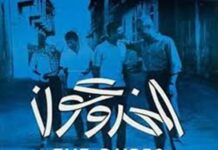Mohammed Rafik Mhawesh
Mondoweiss / May 15, 2022
The truth is, after 74 years Palestinians have never been more united. We will restore our country, we will restore our homes. We will rebuild them, even more beautifully than ever.
Writers everywhere like anniversaries. But I myself don’t. I was asked to write a column of solace and expression for May 15, Nakba Day, in tribute to my people’s nostalgic yearning, and the combination of pain and honor my people feel after 74 years.
Of course, I knew that my column would join a chourus of others passing grief over the loss of our land and homes 74 years ago.
I obliged, still–not out of jingoistic or patriotic egoism–but out of how imperative it has become to fine tune the chaotic perceptions of my people’s message of liberation, and out of the necessity to bust the deceitful stereotypes of our national anniversaries are misrepresented on a broader scale.
Today is a historic day but also an intolerant reminder that we are besieged with wars and dispossession; the life-long traumas that serve as our perpetual reality.
On May 14, 1948, as the British Mandate for Palestine approached its expiration, Israeli Zionist forces hastened their militias to seize Palestinian lands and launched comprehensive campaigns of ethnic cleansing throughout historic Palestine.
Suddenly, more than 750,000 indigenous Palestinians became stateless.
Since then, and perhaps long before, in Palestine writing is survival.
Writing today is not only to stir extra attention to the seven-decade-long struggle of Palestinians — whether of those currently residing home or in exile — to the legitimate restoration of their valid right to return to the fragmented parts of their homeland. But it’s also to uphold a testament to the keys of our homes in the occupied land onto which we still clutch — and which serve as a witness to the systematic cleansing that has been passed down from one generation upon the next.
This longing carries us to the olive and fig trees (the royal trees of Palestinian identity) that, since we cried goodbye to each other, we have solely pledged we’d reunite with and give compassionate hugs, and that we would replant with very authentic Palestinian water.
At present, Israel’s military jurisdiction over the land and the indigenous population of Palestine aims to keep on carrying out the erasure of our presence before the world’s naked eyes, with no regard to whether this population is inside or outside historic Palestine.
Seven decades of have our rights deprived and denied have exhausted the Palestinian people with a paralyzing amount of hardship. Still, the people’s perseverance is rock solid, and we are deeply rooted in our unified efforts to live the memory of the Nakba with hopes of celebration one day soon in a free Palestine.
This perseverance reinforces our persistence in writing about our tragedy and envisioning a life post-liberation, when the cruel occupation is dismantled, and our homeland is restored.
Palestine is not a typical struggle. It’s the yearning to go beyond that. Not on a single day did we base our anti-occupation struggle on the desire of bloodshed or hatred. Rather we seek the mere recognition as humans and all the human privileges that follow, of which we have been deprived.
We also strive for a life of safety and dignity where we’re not afraid of accusations of ‘antisemitism’ simply for chanting ‘Free Palestine.’
Nakba memories grant us an opportunity not only to mark a past national tragic event but also to resonate with creative and resilient ways to further resist the theft of our land.
I know it for sure: regardless of how massive political, economic, and military support Israel has, it will never have enough power to degrade or deny my people’s demands to live in peace and serenity.
I am in my 20s — hundreds of years younger than my homeland — nonetheless I can overwhelmingly say that we grew up together. We went through ups and downs together. When I had my downs, Palestine had my back. I did not blame her for anything. She never failed me.
Palestine was surviving. She was resisting. And growing. And still is. I have supported her, wholeheartedly. So has an entire persevered population.
And now, I am proud that through everything, we’re always there for each other and we know what it is to be on the right side of history together. And I am proud of my people for not allowing anything to overwrite and destroy our identity and history.
In home or diaspora, Palestinians today, teenagers and 80-year-olds alike, fight the occupation that has demographically and geographically has divided us. The truth is, we have never been more united. We will restore our country, we will restore our homes. We will rebuild them, even more beautifully than ever.
After all, Palestine was and will get back to being free and independent; my ‘teita’s backyard’s za’atar ‘thyme’ is whispering to me.
But the brutal question is, how many more painful dreams, and how much more further sacrifice, will it cost?
Mohammed Rafik Mhawesh is a Palestinian journalist and writer based in Gaza












